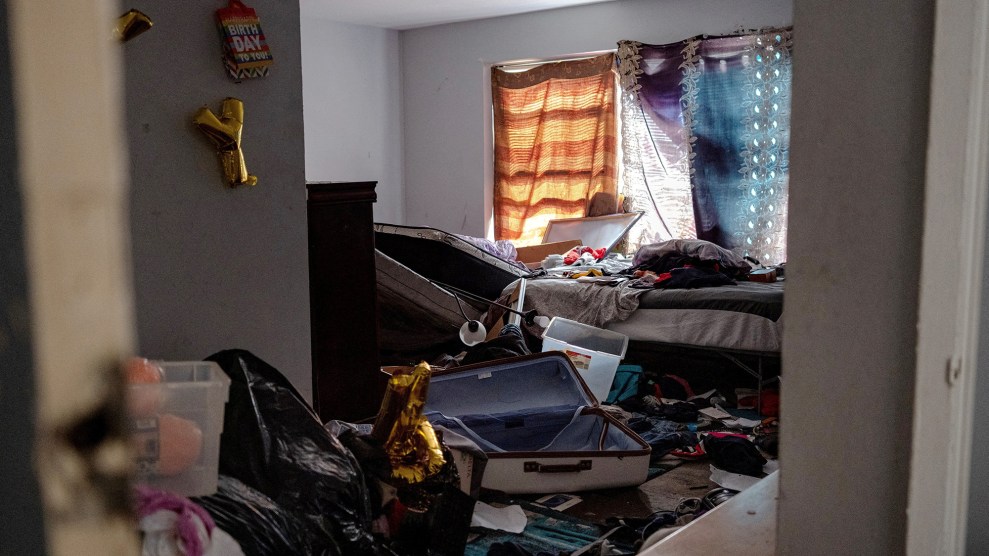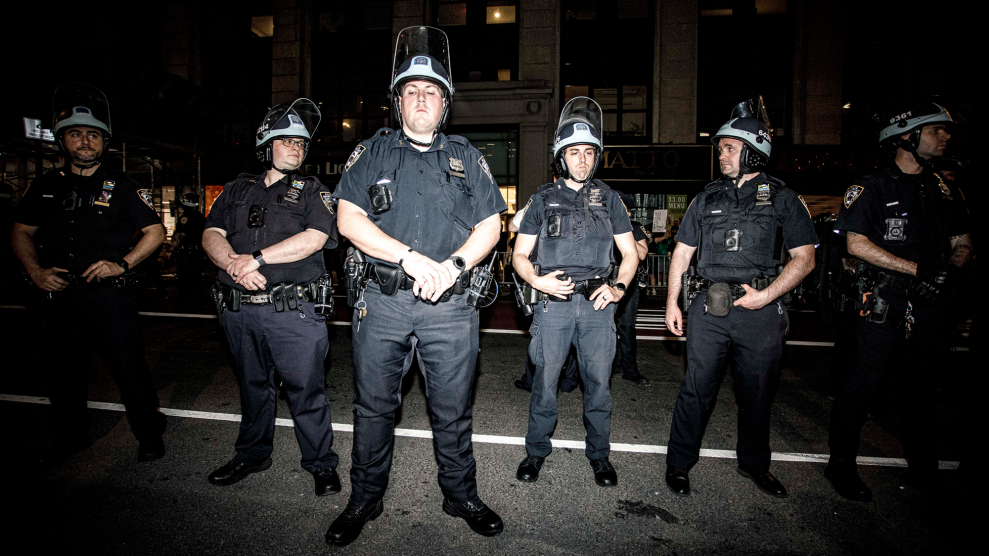
Mani Albrecht/ZUMA
This story was originally published by ProPublica.
The Border Patrol agent, a veteran with 13 years on the job, had been assigned to the agency’s detention center in McAllen, Texas, for close to a month when the team of court-appointed lawyers and doctors showed up one day at the end of June.
Taking in the squalor, the stench of unwashed bodies, and the poor health and vacant eyes of the hundreds of children held there, the group members appeared stunned.
Then, their outrage rolled through the facility like a thunderstorm. One lawyer emerged from a conference room clutching her cellphone to her ear, her voice trembling with urgency and frustration. “There’s a crisis down here,” the agent recalled her shouting.
At that moment, the agent, a father of a 2-year-old, realized that something in him had shifted during his weeks in the McAllen center. “I don’t know why she’s shouting,” he remembered thinking. “No one on the other end of the line cares. If they did, this wouldn’t be happening.”
As he turned away to return to his duties, the agent recalled feeling sorry for the lawyer. “I wanted to tell her the rest of us have given up.”
It’s rare to hear from Border Patrol agents, especially since the Trump administration has put them at the front lines of its sweeping immigration crackdown. Public access to them is typically controlled and choreographed. When approached off duty, agents say they risk their jobs if they speak about their work without permission. As a result, much about the country’s largest federal law enforcement agency — with some 20,000 agents policing the borders and ports — remains shrouded in secrecy, even from congressional oversight, making it nearly impossible to hold it accountable.
Disturbing glimpses of some agents have recently begun to fill the void, including some that were published recently after ProPublica obtained screenshots from a secret Facebook group for current and former Border Patrol agents that showed several agents and at least one supervisor had posted crude, racist and misogynistic comments about immigrants and Democratic members of Congress. The posts raised questions about whether the deplorable detention conditions on the border were out of the control of Customs and Border Protection, as the agency had asserted, or a reflection of its culture.
Other reports followed, including one from CNN that described agents attempting to humiliate a Honduran immigrant by trying to force him to be photographed holding a sign that read in Spanish, “I like men.” The Intercept published more degrading posts from the secret Facebook group, and it reported that it appeared that Border Patrol Chief Carla Provost had once been a member. Provost has not commented.
But there was some nuance. An account of life inside a Border Patrol detention facility outside El Paso, Texas, by The New York Times and The El Paso Times, revealed that two agents there had expressed concerns about the conditions to their supervisors.
The agent who spent June in McAllen doesn’t see his reality in any of those depictions. He’s in his late 30s and is a husband and father who served overseas in the military before joining the Border Patrol. He asked not to be identified because he worried that his candor could cost him his job and thrust him and his family into the middle of the angry public debate over the Trump administration’s border policies.
His comments come at a particularly fraught moment, as politicians on the left compare the Border Patrol’s detention facilities to “concentration camps” and senior Trump administration officials, including most recently Vice President Mike Pence, dismiss descriptions of the inhumane conditions as “unsubstantiated.”
When asked about Pence’s comments, the agent said the damning descriptions of the facilities are “more substantiated than not.” And, while he didn’t embrace the term concentration camp, he didn’t dispute it either. He searched out loud for a term that might be more accurate. Gulag felt too strong. Jail didn’t feel strong enough.
He came around to this: “It’s kind of like torture in the army. It starts out with just sleep deprivation, then the next guys come in and sleep deprivation is normal, so they ramp it up. Then the next guys ramp it up some more, and then the next guys, until you have full blown torture going on. That becomes the new normal.”
Referring back to the grim conditions inside the Border Patrol holding centers, he said: “Somewhere down the line people just accepted what’s going on as normal. That includes the people responsible for fixing the problems.”
He spoke at length in several interviews, making clear that the views and motivations he articulated were his alone. He said he’s not on Facebook, much less a member of any secret Border Patrol social media groups. He also said he did not witness any egregious behavior by his colleagues during his time in McAllen. But he said the agents who were permanently posted there had the shortest fuses, and he’d heard them launch into condescending harangues at the young migrants, blaming them for crossing the border illegally and denying their requests for extra food, water or information about when they’d be released.
Most of his colleagues, he said, fall into one of two camps. There are the “law-and-order types” who see the immigrants in their custody, as, first and foremost, criminals. Then, he said, there are those who are “just tired of all the chaos” of a broken immigration system and “see no end in sight.”
“The only possible end to this that I see is if there’s some change after the next election,” he said, referring to what might finally end the stalemate in Washington over how to reform the system. “Either this president will win again, and Congress will be forced to work with him. Or a new president will get elected and do things a different way.”
In addition to the interviews, the agent shared a journal entry about his time in McAllen, which he wrote in a tentative attempt to sort through what he described as the “roughest” experience of his career; a month that he said revealed a disturbing capacity for detachment.
“What happened to me in Texas is that I realized I had walled off my emotions so I could do my job without getting hurt,” he said. “I’d see kids crying because they want to see their dads, and I couldn’t console them because I had 500 to 600 other kids to watch over and make sure they’re not getting in trouble. All I could do was make sure they’re physically OK. I couldn’t let them see their fathers because that was against the rules.
“I might not like the rules,” he added. “I might think that what we’re doing wasn’t the correct way to hold children. But what was I going to do? Walk away? What difference would that make to anyone’s life but mine?”
When asked whether he simply stopped caring, he said: “Exactly, to a point that’s kind of dangerous. But once you do, you feel better.”
Part of that feeling, the agent said, comes from experience. He’s served Republican and Democratic administrations, each one with its own border crisis and wildly unpopular responses. Other people might find it hard to view his agency outside the context of their political leanings, but he said that he didn’t join because he feels strongly one way or the other. He has a criminal justice degree and was looking for a federal law enforcement job that would provide him financial security, without requiring him to go overseas.
What keeps him in now, even as his job has morphed into one he and his wife are uncomfortable talking about in public, is that he earns about $100,000 a year, including overtime and holiday pay. He has a top-of-the-line health insurance plan that, among other things, covered nearly the entire cost of his child’s birth. In a little more than a decade, when he turns 51, he’ll be eligible to retire with a full pension that probably won’t cover the cost of a house on the beach, he said, but will give him the freedom to “do just about anything else I want, and not have to worry.”
The agent, tall and fit with dirty blond hair, said he thinks of his time left in the Border Patrol like the home stretch of a marathon. He does his work with blinders on to everything but his family and the finish line. “I’m already starting to attend retirement seminars,” he said. “All I’m trying to do is get through the next decade.”
That was his mindset, he said, when he landed in McAllen. It was his first time on the border since he was a rookie. He’d spent most of his career posted in the eastern part of the United States, investigating smuggling organizations rather than intercepting undocumented immigrants. But as huge numbers of Central American migrants came to the Rio Grande Valley, he and hundreds of agents across the country were summoned to help.
In his journal entry, the agent described what he saw when he arrived at the Border Patrol detention center as a “scene from a zombie apocalypse movie.”
His colleagues, he said, wore surgical masks and rubber gloves because there was “sickness and filth everywhere.” And he said the facility “looked like a walled-off compound where the government had the last safe zone and was taking in refugees fleeing the deadly zombie virus.”
The scene that struck the agent the hardest that first day was the sight of dozens of children being held in cages — an image publicized this year to widespread condemnation. The children seemed about the same age as his 2-year-old son, but that’s where the similarities ended. “My kid would have been running laps around that entire building, nonstop,” the agent said. “But the boys my kid’s age, they were just there. They weren’t running or playing, even though they had been pent up all day.”
The agent said he suspected that the kids were lethargic because they hadn’t been given enough to eat. He said he wondered, “Why are things like this?” He said he didn’t look for answers because he didn’t expect he’d find any. “I decided not to dwell on it, and just do my job.”
He went on that way for weeks, seeing things without dwelling on them. His interactions with individual immigrants, he said, are a blur. He vaguely recalled a government staffer combing lice out of a little girl’s hair; 7- and 8-year-olds pacing in circles and sobbing inconsolably because they’d been separated from their parents; a teenage mother who’d swaddled her baby in a filthy sweatshirt that she’d borrowed from another detainee because she’d been forced to throw away the clothes she brought.
Only a few of those encounters are mentioned in the agent’s written account of his experiences in McAllen. Most of it reads like a chronicle of a mundane work trip. He got Memorial Day off. He bought groceries and stopped drinking soda. A colleague who was staying at the Residence Inn shared enough free gym passes to last the entire trip, and his waist size went from 33 inches to 32. He started listening to music again: “Not a specific style, language or rhythm rather music that expressed passion.” And he tried meditation.
The visit by the team of lawyers to the facility near the end of June seemed to shake up the agent. The team, led by a California attorney named Hope Frye, had arrived to interview children being detained in McAllen. The agent’s duties placed him close enough to them to observe their work.
Frye said that typically during such visits, the agents tend to blend into the background; silent and straight-faced, in their badges and drab green uniforms. They didn’t engage much with her because they were instructed not to. She said years of hearing immigrant children tell her how badly they’d been treated in detention had long made her worry about the agents’ humanity. “I’ll look at them and wonder sometimes, ‘What kind of a parent are you when you spend your entire day filled with hate and victimizing other people?’”
But to get her work done, Frye said, she tries to keep such thoughts to herself. At some point in McAllen, however, she let a comment slip to the agent about a young child who had been separated from his family. The agent, she said, blurted out that he knew of another woman who was separated from her family and raising a 2-year-old on her own.
Frye, 68, said she asked the agent if he was referring to his own family. Her question started a series of exchanges that didn’t diminish her suspicions about the Border Patrol, Frye said, but did change her thinking a bit about the agent.
“If what happened was a film, you’d see an older woman with many years of experience, her eyes lined from seeing these poor children, and a young man, with a young family, seeing this nightmare for the first time,” Frye said, recalling her encounter with the agent. “What I thought to myself was, ‘How sad is it that this young man who probably wants to be of service to his country is stuck doing this.’”
Referring to the agent’s initial outburst, she said, “I think he was trying to tell me, ‘Hey, I’m human too.’”
Katherine Hagan, a Spanish interpreter who worked alongside Frye, also interacted briefly with the agent, and, although he didn’t say it in so many words, she felt he was struggling to reckon with his role at the facility, as if, she said, “he had become so accustomed to seeing children behind wire cages that he had assimilated it as normal and necessary.”
At one moment, she said, she recalled him scrambling to find clothes for the baby girl wrapped in the sweatshirt. The baby was so dirty that Frye wiped away rings of black dirt from around her neck. But at another point the agent lectured Hagan about indulging the immigrant children, warning her not to let “the aliens” use the officers’ bathrooms.
“I’m trying to find the right words to describe his demeanor,” Hagan, a graduate of the Harvard Divinity School, said of the agent. “I could tell he felt embarrassed and potentially kind of exposed. I don’t know whether he was having some kind of epiphany. But it was clear he knew that I saw him — really saw him — in the middle of this horrible situation.”
When asked about the interactions, the agent said he was trying to communicate to the lawyers that the detainees were not the only ones at the facility who felt trapped. Walking away, at least in his mind, was not an option. Trying to change things on “a macro level,” the agent said, was for fools.
“The most I felt I could do was make sure toilet paper was stocked. Or if someone wanted an extra juice, I’d give them an extra juice. Or maybe do something to make someone’s day a little nicer; maybe smile and treat them with respect. That’s all I felt I had the power to do,” the agent said. “The ones that try to save the world, they’re the ones who either get burned out or put on a leash.”
The agent compared himself to the cynical donkey in George Orwell’s “Animal Farm” who survives by never sticking his neck out.
“I’ve decided that I’m not interested in advancement,” he said. “I’d rather be a full-time father than a full-time Border Patrol agent.”
But now that he’s home, he feels the experience has somehow followed him.
“I go to the playground with my kid, and I say to myself, ‘Why am I not enjoying this?’”

















